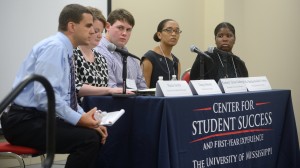
At-Risk Student Summit Pannel Discussion from left; Dr. Travis Hitchcock, Ole Miss, Marie Smith, USM, Doug Johnson, Delta State, Kimberly Taylor-Gathings, MUW, Ra'Sheda Forbes, MSU
OXFORD, Miss. – Motivated to help at-risk college students succeed in attaining their educational goals, more than 100 faculty and staff from Mississippi’s higher education institutions gathered Wednesday (Aug. 14) at the University of Mississippi for a day of inspiration and empowerment.
The At-Risk Summit: Student Success and Persistence was held at UM’s Jackson Avenue Center. Hosted by the university’s Center for Student Success and First-Year Experience, the event prominently featured UM faculty and staff in leadership roles, advising other institutions on how best to support and instruct at-risk students. Included were motivational speakers, a panel discussion and break-out sessions focused on financial aid, connecting with at-risk students by understanding their challenges and perspectives.
“I am glad you are taking time to focus on this critically important issue,” said Hank Bounds, Mississippi commissioner of higher education via a letter read in his absence. “For our students, you help them obtain a college degree, which will enable them to lead a different kind of life from that of someone holding only a high school diploma. You help save them time and money along the way. You help first-generation college students and those who enter college unprepared.”
Ken Sufka, UM professor of psychology and author of “The A Game: Nine Steps to Better Grades,” delivered the first of the summit’s two keynote addresses. Sufka spoke about how at-risk students can overcome the odds to excel at the college and university level.
“Basically, there are four rules for student success,” he said. “Go to class, sit in the sweet spot (front and center), come to class prepared and when lost, ask questions.”
Even high-achieving students often fail for lack of classroom engagement, poor study habits and testing issues, Sufka said.
“A tenth of a grade-point average point can be the determining factor of whether a student stays in college or not. We cannot emphasize enough that a lower grade carries a lot of weight.”
Sufka’s presentation underscored the necessity of correct study habits for maximum academic achievement.
“When it comes to testing, many students erroneously think that pulling an all-nighter is better than prolonged, spaced-out study,” Sukfa said. “The reality is pulling an all-nighter is like studying for an F. Why would anyone do that?”
The renowned scholar suggested faculty and support staff push students toward concept maps (diagrams that organize relationships between persons, things and ideas) and away from merely reviewing notes, flash cards and study groups – practices that may have worked for them in high school but will not be as effective at the university level.
“You can look at something a thousand times and still not know it,” Sukfa said. “To learn and be able to apply complex concepts by thinking critically, students must know how to process information, not merely review or repeat it.”
Ryan Padget, interim director of administration at the University of Northern Kentucky, gave the summit’s closing presentation. He has published multiple manuscripts on college impact, research methodology and the first-year experience in national journals and book chapters, including the 2009 National Survey of First-Year Seminars: Ongoing Efforts to Support Students in Transition, 2011 National Survey of Senior Capstone Experiences: Institutional-Level Data on the Culminating Experience, Journal of College Student Development, Journal of Higher Education and New Directions for Institutional Research.
The morning sessions featured a presentation from Mary Harrington, UM director of institutional research and assessment, who defined the term “at-risk.” Pearl Pennington from the Mississippi Institutions of Higher Learning followed with data about Mississippi at-risk students.
A panel discussion featured representatives from Mississippi State University, Mississippi University for Women, Delta State University and the University of Southern Mississippi. Small-group discussion leaders included Brett Barefoot, UM senior financial aid adviser; and Jennifer Stollman, academic director of UM’s William Winter Institute for Racial Reconciliation, who shared insights about connecting to at-risk students; and UM graduate student Rebekah Reysen.
Sponsors and attendees deemed the summit a huge success.
“We’ve had a phenomenal group of speakers here today who each presented resources, perspectives and ideas not shared before,” said Kyle Ellis, director of the Center for Student Success and First-Year Experience. “The need to assist at-risk students is a statewide issue, and what was offered today will help those students at all eight IHL institutions benefit and have a chance to be successful.”
Natoya Hill, recruitment-retention-program specialist for Mississippi State University’s Office of Institutional Diversity and Inclusion, agreed with Ellis’ observation.
“It’s been very rewarding to hear all the different perspectives and to make the many connections through networking as we’ve done today,” Hill said. “We’re all really here for our students, learning how to impact them and help them graduate from our respective institutions. This meeting shows we’re all headed in the right direction.”